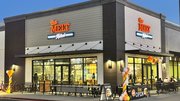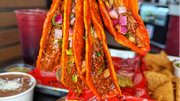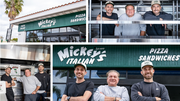Technology
The next great restaurant differentiator: Staying 'always on'
Jack in the Box, Golden Corral, Dave’s Hot Chicken, Blaze Pizza and Golden Chick didn't miss a beat in October when a massive cloud outage brought parts of the global economy to a standstill.

November 19, 2025 by Amir Hudda — CEO, Qu
On Oct. 20 (and again on Oct. 29), a massive cloud outage brought parts of the global economy to a standstill. Retailers couldn't process payments. Rideshare apps went dark. And across the restaurant industry, tens of thousands of locations suddenly couldn't take orders online or in-store.
But not every brand went dark.
Leading restaurant brands like Jack in the Box, Golden Corral, Dave's Hot Chicken, Blaze Pizza, and Golden Chick didn't skip a beat. While competitors scrambled, these brands kept the fryers hot and the orders flowing. These brands had invested in infrastructure built for resilience, with redundancy and failover engineered into its foundation.
When the cloud fails, so can your business
Cloud computing has transformed restaurant technology, but it's also created a dangerous dependency. When every mission-critical function — from orders to payments to kitchen workflows — lives in the cloud, it becomes a single point of failure.
For most of us, cloud outages feel rare and abstract, but their impact is immediate and painful. In restaurants, downtime stops revenue cold. A few hours of interruption can mean millions in lost transactions, damaged trust, and frustrated teams that can't serve guests.
Cloud fails rarely, but your Internet hiccups every day
However, most operators don't lose sleep over the cloud failing. What they do deal with daily is unreliable Wi-Fi. Small, constant hiccups interrupt transactions, delay orders, and create ripple effects that cost revenue and erode guest trust.
Strong cloud architecture doesn't help if stores can't reliably access it. Redundancy has to account for every point of failure, not just catastrophic ones. That's why restaurants need their own version of the cloud: an "in-store cloud."
Cloud deployed, not cloud dependent
Restaurant technology should be cloud-deployed, not cloud-dependent. The difference is subtle but crucial. A cloud-deployed platform uses the cloud to scale and synchronize operations. A cloud-dependent one relies entirely on it to function.
The key is redundancy — specifically, at the edge.
Edge computing brings parts of the cloud directly into each restaurant, giving every location its own local, resilient system that can run even when connectivity fails. Orders, payments, and kitchen operations all keep moving. Data queues locally and syncs automatically once the network returns.
In short, it's like having a backup brain inside every restaurant.
When the recent cloud outages hit, the restaurants mentioned earlier didn't need to "switch over" or reboot their systems. They were running on Qu's Business Edge platform, known as "Qube" — an edge-based architecture that ensures resiliency. Their systems simply kept going automatically.
As Doug Cook, CTO of Jack in the Box, put it: "The engineering of the Qu system is essential; it's about performing well during normal operations and adapting and responding during disruptions."
The new measure of success: uptime
In the restaurant industry, we often talk about metrics like average check size, speed of service, and labor cost. But after this most recent outage, there's a new one that should top every operator's dashboard: uptime.
It's easy to overlook until you lose it.
Why resiliency must come first
Resilience isn't something you can add on later. It must be designed into your tech stack from the outset, whether you're a 2,000-unit chain or a single-location concept.
When we built Qu, we made three foundational commitments:
- Redundancy at every layer — from the cloud to the kitchen.
- Autonomy at the store level — each restaurant must be able to run independently.
- Accountability at the leadership level — our responsibility to keep the industry running is a standing boardroom topic.
That sense of responsibility shapes every decision we make. Technology isn't just an enabler for restaurant staff; it affects their livelihood.
What restaurants can learn from retail, and vice versa
Retail learned these lessons years ago, investing heavily in fault-tolerant systems after discovering the fragility of digital dependency. Restaurants are now catching up.
But restaurants also have something to teach: real-time accountability. No other industry merges manufacturing and retail under one roof and executes it by precision every minute of the day (and night for many brands). When serving thousands of guests every hour, your technology must be both instantaneous and resilient.
That's why restaurants are quietly becoming one of the most sophisticated data industries in the economy. Every order, ticket and transaction tells a story about human behavior in real time. The systems that can process and protect that data, under any conditions, will define the next decade of growth.
The cost of complacency
For years, redundancy was seen as an optional insurance policy against the occasional outage. Now, some have learned the hard way: it's essential.
In a crowded market where diners have endless choices and shrinking wallets, one failed order can send them to a rival for good. Reliability is loyalty. Guests don't think about your systems until they fail — and then they never forget.
Preparing for the next disruption
We can't predict the next outage, but we can prepare for it. Operators should start by asking three questions:
- If my internet goes down right now, can I still process orders and payments?
- Is my POS cloud-dependent or cloud-deployed?
- Do I have visibility into every point of failure, and a plan for each?
If the answer to any of those is "no," it's time to reexamine your foundation.
A collective responsibility
This isn't about one vendor or platform. It's about the industry as a whole. Restaurants shouldn't compete on reliability; they rise or fall on it together.
When multiple brands go dark simultaneously, it erodes guest confidence across the board. That's why we share these lessons openly with partners, peers, and even our competitors. The health of our industry depends on it.
As Leon Davoyan, CTO of Dave's Hot Chicken, said after the Oct. 20 outage:
"We needed a POS that was bulletproof — one that could handle high-volume, including digital sales, without fail. When a major provider outage hit, I was grateful that all of our systems with Qu stayed up and we were able to keep working as if it were just another day."
That's what resilience really means. It's not just about staying online. It's about staying ready for the sake of your team, your guests, and your future.
In today's restaurant industry, uptime is more than just a metric. It's a mission.
About Amir Hudda
Amir Hudda is the CEO of Qu, the company that created the Unified Commerce Platform category for quick-service and fast-casual restaurants. Amir has built and scaled multiple companies across enterprise software, cloud, security, and analytics, raising more than $100M in capital and leading several to acquisition. Under his leadership, Qu has reimagined restaurant infrastructure through early adoption of edge computing and a unified approach to POS and digital ordering. In 2025, Amir was named a Finalist for EY’s Entrepreneur Of The Year® and joined the Forbes Business Council.
Included In This Story
Qu
Qu is the unified commerce platform helping quick-service and fast-casual restaurants boost efficiency and grow revenue. Purpose-built from the ground up with smart cloud technology, Qu puts real-time intelligence where it’s needed most—right in the restaurant—through its proprietary Business Edge, Qube™.
 ChatGPT
ChatGPT Grok
Grok Perplexity
Perplexity Claude
Claude
















